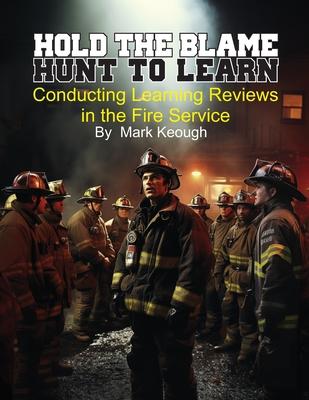Hold the Blame - Hunt to Learn helps aspiring or current fire department incident safety officers (ISO) and health and safety officers (HSO) prepare to conduct incident learning reviews after adverse events and successful operations. The book offers reflections for how or why learning reviews should be performed. Chapter one is a brief historical look at things that have influenced our perceptions of safety review work and practices. Chapter two considers organizational issues requiring reflection due to their importance, specifically culture and behavioral based safety practices. Chapter three dives into the practical performance of conducting reviews. Factors to consider are offered for when to do a full learning review versus a simple assessment. Chapter four outlines the three phases of a review. The first phase, discovery is compartmentalized into collecting the equipment, collecting witness accounts, and consideration for building a timeline is offered. The second phase is conducting the analysis. The third phase is how to interpret the information and disseminate it throughout the organization. Chapter five reviews a small variety of topics that influence the direction and outcome of a learning review: psychological safety, success, and what's wrong with someone falling on the sword for the team. Consideration for job requirements outlined in NFPA 1021: Standard for Fire Officer Professional Qualifications, 2020; NFPA 1500: Standard on Fire Department Occupational Safety, Health, and Wellness Program, 2021, and NFPA 1521: Standard on Fire Department Safety Officer Professional Qualifications, 2020, are offered.

Hold the Blame - Hunt to Learn: Conducting Learning Reviews in the Fire Service
Hold the Blame - Hunt to Learn helps aspiring or current fire department incident safety officers (ISO) and health and safety officers (HSO) prepare to conduct incident learning reviews after adverse events and successful operations. The book offers reflections for how or why learning reviews should be performed. Chapter one is a brief historical look at things that have influenced our perceptions of safety review work and practices. Chapter two considers organizational issues requiring reflection due to their importance, specifically culture and behavioral based safety practices. Chapter three dives into the practical performance of conducting reviews. Factors to consider are offered for when to do a full learning review versus a simple assessment. Chapter four outlines the three phases of a review. The first phase, discovery is compartmentalized into collecting the equipment, collecting witness accounts, and consideration for building a timeline is offered. The second phase is conducting the analysis. The third phase is how to interpret the information and disseminate it throughout the organization. Chapter five reviews a small variety of topics that influence the direction and outcome of a learning review: psychological safety, success, and what's wrong with someone falling on the sword for the team. Consideration for job requirements outlined in NFPA 1021: Standard for Fire Officer Professional Qualifications, 2020; NFPA 1500: Standard on Fire Department Occupational Safety, Health, and Wellness Program, 2021, and NFPA 1521: Standard on Fire Department Safety Officer Professional Qualifications, 2020, are offered.